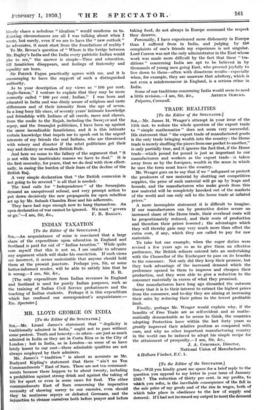TRADE REALITIES
[To the Editor of the SPECTATOR.]
SIR,—Mr. James H. Weager's attempt in your issue of the 11th inst. to reduce the whole question of the export trade to " simple mathematics " does not seem very successful. His statement that " the export trade of manufactured goods is the only trade bringing wealth into the country : the Home trade is merely shuffling the pieces from one pocket to another," is only partially true, and it ignores the fact that, if the Home trade—which pound for pound is just as important to our manufacturers and workers as the export trade—is taken away from us by the foreigner, wealth in the sense in which he uses the term must leave the country.
Mr. Weager goes on to say that if we " safeguard or protect the producers of raw material by shutting out competitive supplies, the price of such material will go up by leaps and bounds, and the manufacturers who make goods from this raw material will be completely knocked out of the markets of the world and can only sell to the home trade at inflated prices."
A more incomplete statement it is difficult to imagine. If our manufacturers can by protective duties secure an increased share of the. Home trade, their overhead costs will be proportionately reduced, and their costs of production and therefore their prices lowered ; the advantages which they will thereby gain may very much more than offset the extra cost, if any, which they are called to pay for raw materials.
To take but one example, when the sugar duties were revised a fcw years ago so as to give them an effective preference, the British refiners entered into an• undertaking with the Chancellor of the Exchequer to pass on its benefits to the consumer.. Not only did they keep their promise, but they took advantage of the increased demand. which the preference opened to them to improve and cheapen their production, and they were able to give a reduction to the consumer materially in excess of what they promised.
Our manufacturers have long ago discarded the outworn theory that it is to their interest to extract the highest prices from the consumer, and to-day they are aiming at increasing their sales by reducing their prices to the lowest profitable limit.
Finally, perhaps Mr. Weager would explain why, if the
benefits of Free Trade are as self-evident and as mathe- matically demonstrable as he seems to think, the countries adopting Protection have within the last forty years so greatly improved their relative position as compared with ours, and why no other important manufacturing country in the world can be induced to adopt his simple recipe for the attainment of prosperity.—I am, Sir, &c., J. A. Coacoaix, Director,
• National Union of Manufacturers. 6 Holborn Viaduct, E.C. 1.






































 Previous page
Previous page